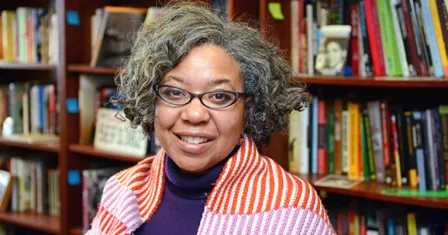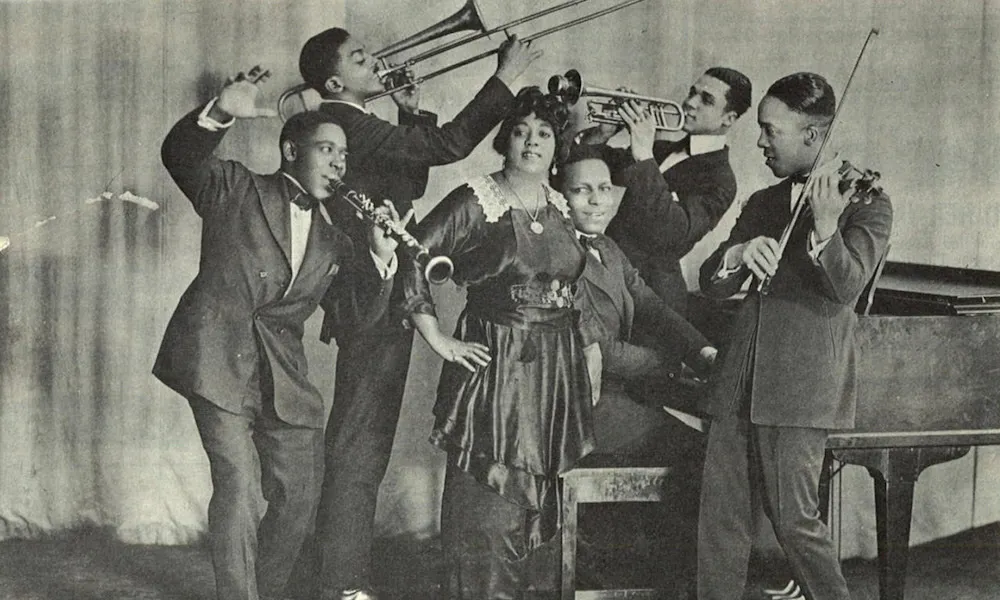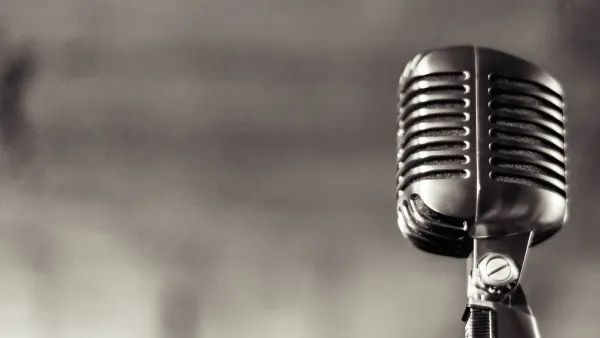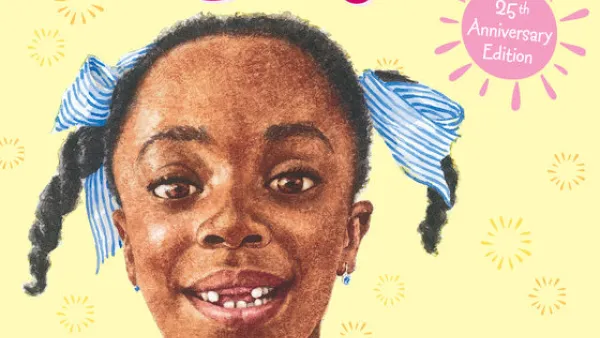Paige McGinley is associate professor in the Performing Arts Department and author of “Staging the Blues: From Tent Shows to Tourism.”
In this lecture preview, performance studies scholar Paige McGinley interviews Faculty Book Celebration keynote speaker Daphne A. Brooks about her work on black sonic history and writing for popular and academic audiences, and gives a glimpse at the professor’s playlist.

You’ve just completed a new book — the first volume of a trilogy, in fact! Tell me about it.
The trilogy is called Subterranean Blues: Black Women Sound Modernity, and it tells the story of black women’s radical musicianship across two and half centuries. So it needed to be divided up! The first volume, which is called Minor Notes for the Revolution: Intellectual Labor and Black Feminist Sounds, should be coming out by the end of this year.
The whole point of this book is to rethink black sonic history by starting with the culture workers themselves, and how they managed and thought about their own sound. I also try to invite into the circle performers we don’t often think of as having something to do with black popular music history, such as Zora Neale Hurston. It’s thinking about archives and collectors, and the ways a particular kind of standard narrative about black women’s vocality and black women’s performance history has been produced and controlled by a very small cadre of thinkers. And it traces a counter-history of the ways that black women musicians themselves, as well as a heterogeneous cluster of black feminist thinkers (and collectors and creative writers) have cared for black women’s musicianship. The last section of the book looks at contemporary performers who are doing their own archival work through their performance repertoires — people like Rhiannon Giddens, Cécile McLorin Salvant and Valerie June.
Your first book, Bodies in Dissent: Spectacular Performances of Race and Freedom, 1850-1910, shows us how 19th- and early 20th-century black women performers deployed a range of strategies to intervene in representations of blackness on both sides of the Atlantic. What inspired you to then turn to these questions of music and the sonic?
I’ve always been thinking about these questions! I grew up thinking I was going to be a rock critic. I wanted to be the first black feminist rock critic to have a column at Rolling Stone, to try to intervene in the misogyny and the racism of that publication. And then I took a left turn through black feminist literary cultural criticism and performance studies. That really unfolded during my undergraduate years at Berkeley, when Gabrielle Foreman, who at the time was a graduate student, and Barbara Christian, who was my other mentor at Berkeley, encouraged me to think about graduate school. I knew there was this strong intellectual side of me that was passionate about black feminist literature, but there was the other side of me that grew up as a post-civil rights baby, loving punk rock and new wave and burgeoning hip hop. And I wanted to write about it all.
I wrote Grace, about Jeff Buckley, for the 33 1/3 series at Continuum Press, and after that book was done, I thought that there should be a way to merge my interest in black feminist performance histories and popular music criticism history.
For years now, you’ve been writing both for scholarly audiences and for a broader public, and you’re well known for your popular music criticism in The Guardian, The Nation and other publications. What advice do you have for folks who want to write in different modes and for different audiences?
In 2008, I wrote a piece about Amy Winehouse for The Nation, and then I wrote a long academic piece that I’d given as a keynote at Berkeley in Performance Studies. I started with the popular piece. But I wanted to amplify critical dimensions of that popular piece so that they would resonate in academic circles and be understood as part of these longer debates that you and I have been immersed in, in Black studies, theater and performance studies, and American studies for many, many years now. I wanted to raise the stakes of how we understand the importance of popular music as an objective, serious and rigorous inquiry. And there were plenty of other people who were doing that, especially at EMP [the Experience Music Project annual conference, now called PopCon] in Seattle. That space was so important for helping me cultivate a different kind of voice and experimentalism in my writing. It’s important for our students to know that there are multiple spaces where we can flex our creative muscles in a variety of different contexts.
In the book I just finished, I’m trying to speak to a reader who hasn’t been served, someone who is conversant in Adorno and who also reads Pitchfork. I think what I’ve always tried to do is to invite a reader into a space of familiarity, but one that also makes you work a little bit. If you’re comfortable enough — and enticed enough by the creative form of the author’s voice — you’re going to be open to exploring avenues of thought that you haven’t before. It’s a tricky line to walk, but if you enjoy story-telling as a process in writing, and you can promote that level of pleasure and create a circle in which your reader is also enjoying the process of being told a story, then you can push your reader to “think otherwise,” as our dear colleague José Muñoz always said.

The talk you’re delivering at WashU is entitled “Blackface Broken Records: On the Eve of the Blues Feminist Experiment.” Could you give us a preview?
In the talk, I’m thinking about the prehistory of the blues as it relates to blackface. More specifically, it’s about the relationship between classic blues women performers, turn-of-the-century blackface culture and anti-black violence that manifested in East Saint Louis in 1917, and in Charleston in 1919. Perhaps we could call it an ethnography…an ethnography of black women’s sonic practices as they emerged in relation to white supremacist violence in the Jim Crow era.
Finally — and this is the human interest question! — what are you listening to right now?
The obvious answer is that early in 2019 I was listening to a lot of Lizzo! I'm excited for her, and I think she’s done some really savvy things to stay on top of this pop moment. I’ve been loving the soundtrack to the Broadway musical version of David Byrne’s American Utopia. I will shock people by saying that I think the Billie Eilish album is terrific; that one grew on me over time. The Queen & Slim soundtrack is fantastic. And FKA twigs’ Magdalene is her best record yet. Oh, and Brittany Howard’s Jaime. I can’t forget that! That was the best album of last year.
McGinley’s book Staging the Blues: From Tent Shows to Tourism was published by Duke University Press.
FACULTY BOOK CELEBRATION
Blackface Broken Records: On the Eve of the Blues Feminist Experiment
Daphne A. Brooks, the William R. Kenan, Jr. Professor of African American Studies, and Professor of Theater Studies, American Studies, and Women’s, Gender, and Sexuality Studies, Yale University
Thursday, January 30, 2020
4:00 PM
HILLMAN HALL, CLARK-FOX FORUM
Washington University faculty speakers
William Acree
Associate Professor of Spanish, American Culture Studies (Affiliate) and Performing Arts (Affiliate)
Associate Director, Center for the Study of Race, Ethnicity & Equity
Staging Frontiers: The Making of Modern Popular Culture in Argentina and Uruguay
Jonathan Fenderson
Assistant Professor of African and African-American Studies
Building the Black Arts Movement: Hoyt Fuller and the Cultural Politics of the 1960s
See also the related panel discussion
Resistance Acts
THURSDAY, JANUARY 30
12 pm | Olin Library, Room 142
Lunch provided (please RSVP on the event website)




